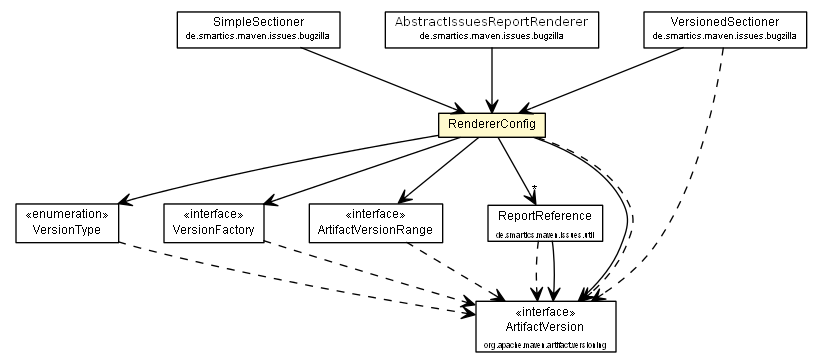
|
||||||||||
| PREV CLASS NEXT CLASS | FRAMES NO FRAMES | |||||||||
| SUMMARY: NESTED | FIELD | CONSTR | METHOD | DETAIL: FIELD | CONSTR | METHOD | |||||||||

java.lang.Objectde.smartics.maven.issues.RendererConfig
public final class RendererConfig
Configuration to control the rendering process.
| Nested Class Summary | |
|---|---|
static class |
RendererConfig.Builder Builder to create instances of type RendererConfig. |
| Method Summary | |
|---|---|
ResourceBundle |
getBundle() Returns the message bundle for labels. |
List<String> |
getColumns() Returns the value for columns. |
List<String> |
getColumnWidths() Returns the value for columnWidths. |
String |
getComponent() Returns the value for component. |
org.apache.maven.artifact.versioning.ArtifactVersion |
getCurrentReleaseVersion() Returns the current version of the project. |
String |
getDescription() Returns the description to be set in the configuration to be used instead of the one found in the localized files. |
File |
getDescriptionFile() Returns the description file is a XDoc file to be included as-is into the generated report. |
String |
getDescriptionFileBodyContent() Reads the body content from the description file. |
String |
getFooterText() Returns the text to be added as a footer as raw text. |
int |
getIncludeComponentAtIndex() Returns the value for includeComponentAtIndex. |
int |
getIncludeComponentAtIndexColumnWidth() Returns the value for includeComponentAtIndexColumnWidth. |
VersionType |
getIncludeOnSamePageAllOfVersion() Returns the value for includeOnSamePageAll. |
String |
getNoResultsDescription() Returns the description to be set in the configuration if no issue matches the query to be used instead of the one found in the localized files. |
String |
getQueryName() Returns the name of the query to execute. |
List<ReportReference> |
getReportReferences() Returns the references to former reports. |
List<String> |
getSections() Returns the order of the values specified for the section type. |
String |
getSectionType() Returns the type (probably but not necessarily a user type) that specifies the information in the issue that is used to group the issues in sections. |
String |
getTitle() Returns the title to be set in the configuration to be used instead of the one found in the localized files. |
VersionFactory |
getVersionFactoryInstance() Returns the factory to create comparable version instances. |
ArtifactVersionRange |
getVersionRange() Returns a range defining the versions of issues to be rendered. |
boolean |
isRenderEmailAdresses() Returns the value of the flag that indicates whether or not eMail addresses should be rendered. |
String |
toString() |
| Methods inherited from class java.lang.Object |
|---|
clone, equals, finalize, getClass, hashCode, notify, notifyAll, wait, wait, wait |
| Method Detail |
|---|
public ResourceBundle getBundle()
public String getComponent()
Sets the component(s) that you want to limit your report to include. Multiple components can be separated by commas. If this is set to empty - that means all components.
public String getSectionType()
For example a user type ct_type may be defined to specify the type of an issue. Valid types could be Bug, New Feature, Improvement, and Task .
public List<String> getSections()
section type. Only values specified in this list will be rendered at all.
Regarding the example given for getSectionType(), this list could define New Feature, Bug, Improvement . This would render issues tagged as new features in the first, issues tagged as bugs in the second and issues tagged as improvements in the last section. Issues tagged as tasks will not be rendered.
section type.
public String getQueryName()
public List<String> getColumns()
Lists the columns to be rendered. Each element of this list is a property of an issue. The identifiers given here must match the ones defined in the referenced issue management system. E.g. for Bugzilla these are defined in org.eclipse.mylyn.internal.bugzilla.core.BugzillaAttribute.
public List<String> getColumnWidths()
Lists the column width to be used to set to the columns. If the value is 0 (zero) no width will be set explicitly for that column.
public int getIncludeComponentAtIndex()
Specifies the index (zero bases) of the column at which the component information is to rendered. This option is only taken into account if the component property does not specify exactly one component. Please note that this cannot be used in named queries.
This is a handy option for running the report on a multi project. Sub projects specify exactly one component while the parent project specifies none. The result with setting an index of e.g. 1 is that in each sub project the component is not mentioned while it is on the parent project (listing all issues of all projects) it is rendered at the second column.
public int getIncludeComponentAtIndexColumnWidth()
Specifies the column width for the includeComponentAtIndex property. If that property is not set, this property value is ignored.
public boolean isRenderEmailAdresses()
A value of true indicates that the eMail address should be rendered (e.g. as a mailto anchor in HTML for an assignee name), false if no eMail address information should be written.
public VersionType getIncludeOnSamePageAllOfVersion()
On the same page all of the given version type are rendered. For instance if this value refers to the major version, all versions having the same major version are rendered. A value of micro implies that only the current version is to be rendered.
Defaults to VersionType.MAJOR.
public ArtifactVersionRange getVersionRange()
public org.apache.maven.artifact.versioning.ArtifactVersion getCurrentReleaseVersion()
public VersionFactory getVersionFactoryInstance()
public String getTitle()
This value may be null in which case the renderer retrieves a default value (probably assuming that a release notes report is rendered).
public String getDescription()
This value may be null in which case the renderer retrieves a default value (probably assuming that a release notes report is rendered).
public File getDescriptionFile()
public String getNoResultsDescription()
This value may be omitted in which case the renderer retrieves a default value (probably assuming that a release notes report is rendered).
public String getFooterText()
public List<ReportReference> getReportReferences()
public String getDescriptionFileBodyContent()
throws IOException
description file.
IOException - if the file cannot be parsed to extract the body element content.
public String toString()
toString in class
Object
Object.toString()
|
||||||||||
| PREV CLASS NEXT CLASS | FRAMES NO FRAMES | |||||||||
| SUMMARY: NESTED | FIELD | CONSTR | METHOD | DETAIL: FIELD | CONSTR | METHOD | |||||||||